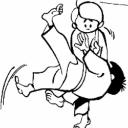Yahoo Answers is shutting down on May 4th, 2021 (Eastern Time) and the Yahoo Answers website is now in read-only mode. There will be no changes to other Yahoo properties or services, or your Yahoo account. You can find more information about the Yahoo Answers shutdown and how to download your data on this help page.
Trending News
What does MMA have that TMA does not?
Many MMA practitioner here claim that TMA is out dated and no longer effective when the way I see it is that not only do MMA schools and gyms come from the teachings of TMA I also see no modifications to them and the used techniques are in countless numbers of TMAs.
I know there are several here that train in both an MMA gym and a traditional Kwoon, Dojang and/or Dojo. I look forward to your input as well.
To those who argue TMAs are "out dated": Without resorting to a youtube video or link of any kind, how is MMA better than TMA and what does MMA have that TMA doesn't?
Also, it's argued TMAs are not effective in real self defense. Without resorting to competition results (this style vs that style) or again a video link, what proof is there that MMA is better for real life or death situation?
*****NO YOUTUBE VIDEOS!*****
Only you're own logic, knowledge and experience.
23 Answers
- ShienaranLv 71 decade agoFavorite Answer
What MMA offers that TMA does not, is the shortcut to winning. While this is not a bad thing in itself, but it allows people who are not supposed to be in the ring or cage in the first place the opportunity to do so. Whereas in TMA it takes years of training to gain rank, become proficient and your skills considered up to standard. In MMA all it takes is a few months of training in basic striking, some rudimentary wrestling and ground defense and you're good to go. In MMA, the rules make it possible to win by brute force, regardless of whether your technique was good or sloppy. As a matter of fact, aggression is rewarded and becoming too defensive is penalized. One also need not train extensively in techniques to be considered an expert, all you need is to rack up enough wins and you're basically the same status as a master, you can even come out with a DVD on your winning methods, never mind if those methods are not exactly up to par with the standards of the mother art it was derived from(Judo, Boxing, Muay Thai, Wrestling, Jiujutsu etc.). Now I'm not saying there are no legitimately skilled MMA fighters out there, it's just that MMA's standard is not as legitimate as most fan boys paints it to be and there are more TMA rejects in it's ranks than one can count. I have no beef against MMA per se, I enjoy it as a sport and I have many friends who are MMA fighters and have trained with them frequently. It's only the perception that MMA is a legitimate martial arts style that I have a problem with. It started out as a fighting format, but somehow got hijacked and is now considered a style, this leaves a lot of gray areas when it comes to standards and that's what I have a beef with, that anyone can think that all you need is a lot of aggression, cardio, a knockout punch and maybe a crude armbar or choke with a lot of luck and you're ready to take on anybody. It's the kind of mentality that could get you seriously injured. I should know, I've seen friends who thought that was all they needed and against my advice, stepped into the ring against a very skilled opponent and got their face rearranged.
- Anonymous1 decade ago
I'm going to play the devils advocate here and see if I can at least understand why it is that people come about the idea that MMA is better to TMA:
TMA's are from much older systems, which many have seen to become outdated or seen to be less effective as time rolled by due to cynicism towards many movies or other such things. More cynicism comes about when people see demonstrations of some art, such as aikido. In Aikido demonstrations, you seldom see a real attack, but rather a much more controlled environment than the real world. You see the aikidoka that is being demonstrated on throw a rather week punch or kick, and then a fabulously pretty technique follows it. However, the real world won't go like that. Anyone who has done legitimate sparring trying to use these techniques will notice just how difficult these moves are, especially against trained opponents. A major hand throw is very nice, but also very hard to pull off.
From here many would say, "As this technique is hard to use in a real fight, and aikido has not removed it or changed it, therefore aikido is not continuously improving". Furthermore many TMA dojo's do not train realistically. If you've ever been to certain less than satisfactory competition taekwondo schools then you know what i mean. Furthermore, many TMAs do not emphasize fighting your opponents in ways that many would consider legitimate, such as the idea of grounding an opponent without yourself going down, would inquire suspicion from more modern people.
I actually have run out of arguments, so there's my attempt at devil's advocate.
EDIT: @Patrick, yes I two am perplexed by the boundaries between what people would call Traditional or Modern. The easiest dividing line would in my opinion be the foundations of MMA and the more modern forms of training coming about after Bruce Lee. But, I'm not good enough to really define tradition vs modern.
- Husky NinjaLv 41 decade ago
Any MMA practitioner that really thinks TMA is no longer effective is full of himself and/or ignorant. I do agree with Jim though that all MMA gyms teach in full-contact and although many TMA also teach in full-contact, there is a very large portion that doesn't, so that would be an advantage for MMA. My personal criteria for a martial art is for it to have enough contact, be practical in real situations, and have effective and challenging training. The majority of legitimate TMA schools include all of those.
In a life or death situation I think any martial art is better than nothing but I don't think there is always a clear victor between MMA and TMA in this category. Up against a weapon, yeah I'd probably take a TMA but being jumped by some guys, MMA can still hold its own in real life defense. Overall I think it comes down to the fighter and not the art he knows.
Most of this argument starts from MMA fanboys that beat the crap out of a kid with a McDojo black belt. The McDojos are all they know of TMAs so they often get the wrong idea. That could end up very bad for them if they ever assumed this of a legit black belt.
Source(s): BJJ Practitioner - possumLv 71 decade ago
One comparison has to do with realism vs sport, as if realism means that there are no competions, and that sport has no place in self-defense. I think the reality has to do with boundaries. MMA fighters compete just as much as TMA fighters do. There are MMA students who practice for self-defense, just as TMA fighters do. And of course, there are those that fall somewhere in the middle - in both MMA and TMA. So I don't think the common complaint of realism is accurate.
Another comparison has to do with effectiveness. Shotokukan, for instance, is an art that studies about ancient Japanese feudal-era weapons. You can say all you want about how there are hidden techniques and how weapons are extensions of the body. In styles like these, there is mindset. Should one fight today the way a typical samurai warrior did in the old days, the modern samurai would either be thrown in jail, since samurai did not leave a living foe, would be killed, because training didn't often include more than 1 opponent at a time, given the taboo against 2-on-1 fighting in the old days.
So I think the older fighting systems went through a MMA of sorts - perhaps an evolution. I wonder what the older samurai thought of the younger samauri who practiced fighting against multiple or unarmored opponents? Probably, they both felt they way we modern TMA and MMA feel about each other.
Another issue is that the MMA folks often take what they perceive as the good parts out of a fighting system and dispense with the rest. Not surprisingly, forms get nixed. But so do old weapons - like long, short, and crossbow; sword; and spears. Not surprisingly, it's not uncommon to find fighting systems defending against nothing but guns and knives.
Our community can't even come to consensus as to what makes something a "martial art", let alone what a traditional one is. Is wrestling and boxing a martial art? Is Krav Maga a martial art? Most seem to agree that taekwondo and aikido are "traditional martial arts", yet they are 50 years old - give or take a decade. Why do we label them traditional martial arts, yet not label the likes of Krav Maga as not even a martial art?
In the end, I think the complaints of MMA and TMA against each other are no different than the older arts generations ago. When Korea wanted to Koreanize taekwondo, the pro-Korean nationalists chided the conservative (Japanese-flavor) styists. Aikikai and Tomiki style aikido chide each other for doing the things they do. Inevitably, our TMA will evolve into the average between what's traditional and what the MMA folks want. It is all effective - no one can deny it except those who point to friend-of-a-friend fight experience, or a few youtube videos. The traditionalists point to a long solid history, which proves it works. The new stylists point to evolution in fight strategies, weapons, laws, and ethics (or lack therein) that make their systems better.
- The CollectorLv 51 decade ago
Being a fan of TMA I will try to play the devils advocate. Most, but certainly not all, MMA gyms train well, the sparing is typically 50%-80% contact where as most TMA dojo/dojangs train with no to light contact. 50%-80% contact is a much more effective.
Another thing is katas, a large majority of instructors teach kata but they rarely teach application. I had an instructor that would tell us how to do the katas and the movements but when I asked him why we did it that way and what the application is, he wound up clueless. I may as well have not been doing the katas at all.
The reason that people are considering TMA outdated is because people are training with no to light contact for whatever reason, (insurance purposes, fear of being sued, etc.) when MMA gyms train with more contact which is more practical and also because of the katas being taught ineffectively.
Source(s): Fan of TMA but also admit that usually it's being taught incorrectly. - ?Lv 71 decade ago
I think the only thing that MMA has over traditional martial arts is that it embraces a wide variety of skills and techniques across the board from take-downs and throws, to chokes and submissions, together with all the striking and kicking aspects as well as the use of knees and elbows under one roof. Otherwise it has nothing over TMA and most good martial artists that I know who study TMA have studied more than one art to add to their arsenal, various aspects like those that I mention there for MMA. Otherwise I don't think it brings anything else to the table other than the sparring aspect and the opportunity to use all those things in application more fully than maybe the sparring that might be done in TMA.
Beyond this I don't think it does as good at some things as TMA does in general. Kicking is a good example of that and look at Cung Le who comes from a martial arts background. Not many MMA fighters can kick like him and that only comes from practice and repetition like what you get in TMA. This is why many of your top fighters have now incorporated a variety of coaches in their training camps like boxing , jujitsu, and karate coaches. However for the average MMA practitioner who is just getting this from maybe one person who might have some limitations in one or more of these areas a student may have to also go else where then.
Most of the fighters and coaches who think TMA are outdated or diss TMA have little or no knowledge or background in TMA to begin with and so they say and feel this out of ignorance. Some whom I have worked with will change that thinking when I give them the background to something like it came from a traditional martial art and was done because of whatever. Once you explain something to them and can relate it back to TMA a light will sometimes go on in their head and they then start to better understand some things and look at things through new eyes and with a more open mind.
As for the argument that TMA are not effective in real self-defense they have worked pretty well for me over the past forty years and I dare say that some of the other old timers in this forum can attest to the same thing.
- Shiro KumaLv 61 decade ago
IMHO, in general, what MMA has and TMAs do not - or perhaps no longer has - is spirit. When we look at mainstream TMA practitioners today, what we see is - more often than not - a hobbyist. Look at the typical MMA practitioner, and you'll often see much more dedication than your typical TMA student, as well as a willingness to train hard and accept the fact that "martial" often means hard contact.
This is how TMA used to be practiced. Sure, there are actually plenty of places where TMA training is intense, which leads to a high standard of quality (including effectiveness) among practitioners. But nowadays, most TMA schools cater to people looking for a hobby, a pasttime: an art with a martial history instead of an art focused on martial skills.
I am an aikidoka; and although I count myself lucky as having trained in several very "martial" dojos, I really can't say the same for aikido in general. Meanwhile, those people I've known or met who are interested in MMA (or other, more modern systems) tend to be people who are looking for and are ready for intense training. TMA, then, is "outdated" in that many people no longer find authentic traditional training methods appealing. Others mistake the "self development" and "self betterment" aspects of traditional arts to mean that traditional martial skills is no longer the focus of the art.
Aikido training, for example, used to include atemi/striking drills, traditional push-ups (http://www.youtube.com/watch?v=X79LlPDmpOM ; sorry for the YouTube link, but I don't know how to properly describe this), "alive" randori and jiyu-waza drills, and a sense of overall urgency during training. Now I rarely find dojos where these aspects are practiced; and since I do include them in classes I teach, I've met with a lot of resistance and protest from guests from other dojos, or when I'm asked to teach in other dojos.
Does this mean that TMA is less effective than MMA? No. But training in most mainstream, commercial TMA dojo/dojang/kwoon/schools is not geared towards actual martial effectiveness; while training in most MMA gyms do prepare students for more dynamic and hard-hitting situations.
So, basically, IMHO, a traditional or classical martial art - in its entirety - offers a more complete range of skills. But what it - as a whole - lacks today is the presence of effective training in a significant portion of schools.
EDIT:
While I agree with Patrick's argument about the dichotomies prevalent in any discussion regarding martial arts, I believe that this question concerns TMA and MMA as seen by the public.
EDIT:
Great point by callsignfuzzy!
" ... the way they THINK they were done in the 1700's"
When it comes to "traditional" training methods, people often imagine something exotic, something different from plain-old hard work that will turn you into the strongest human being without push-ups and other "conventional" methods.
- SteppingLv 41 decade ago
How many people have actually experienced real training and instruction from an experienced and qualified instructor of any traditional martial art? How many people would be willing to tuff it out? Not many at the local strip mall. There are so many mc dojos and now there are getting to be quite a bit of MMA frauds. Right now the only thing MMA does not have compared to TMA is the number of pis poor instructors and crappy schools. Don't worry, they will catch up...
- PatrickLv 41 decade ago
"Traditional martial arts" versus "mixed martial arts" is a false dichotomy. Unfortunately, this is a discussion to which we are easy to fall prey.
"self defense" versus "martial arts"
"performance (extreme) martial arts" versus "traditional martial arts"
These are all false dichotomies.
The keys are versatility (control, grappling, striking, trapping, vital points striking) and training method.
If your martial art has significant versatility and utilizes modern training methods then the name and tradition of the martial art is irrelevant.
The difference is merely the focus on the following:
1. anatomy and physiology to understand the principles of striking and grappling especially vital points
2. plyometrics
3. interval training
4. flexibility (arguments can be made here about which systems are most effective)
5. toughness (hardening of striking surfaces)
6. realism (depends on your goals)
7. self awareness
8. execution of technique
* Self improvement has increased focus on self awareness.
* Performance martial arts have increased focus on flexibility, (physical) self awareness (aka proprioception) and execution of technique.
* Self Defense has a primary focus on realism but can't neglect any area.
* Combat sports have a focus on plyometrics, interval training and realism.
* Traditional martial arts have varying focuses depending on the system and depending upon the definition of traditional martial art. Traditional martial arts could have any of the above as their goal.
In my opinion, these are simply different sides of the same dice. An unbalanced dice causes a biased result. However, the challenge lies in balancing the focus to have a martial art that can be a source of self improvement and self defense. The "performance" is in proper execution of technique and combat sports are a (biased) hybrid of all three as should a "traditional martial art" be.
When forced to choose, I must side with mixed martial arts due to the overwhelming preponderance of mediocre martial arts schools. I admit my viewpoint is skewed though since I live in the home city of MMA and we have several outstanding MMA camps. We also have many excellent traditional martial arts schools and virtually any martial art available. The difference is that we also have 10 mediocre martial arts schools for every good school. The quality of MMA camps are relatively easy to discern since you can easily see their collective record.
Having said all this, virtually everyone here is "mixing" martial arts. While you can find purist instructors in many styles the instructors do speak to others and collaborate.
Interesting that anyone would say Aikido is a traditional martial art. Therein lies the problem. Aikido is very young as a martial art (founded in 1942) and had a non-martial focus on philosophy.
- Jim RLv 71 decade ago
J
I see a single advantage of MMA training over TMA of some types. They train with contact. That is their singular advantage over many "traditional" arts.
I see and have proven in the dojo that those of us who train karate in a full-contact manner do not suffer from this difference. Our arts are not for the ring, and so are deemed (rightfully so) unfair to competition.
They talk fo a good fight. We talk of getting out of a fight without fighting.
This has always been an argument of apples and stones, yet many of the younger MMA/UFC can not tell the difference, and try to eat the stone, including the illustrious poster who inspired your question. Those of us who have had the experience of being forced to repeatedly use our skills in the world at large know very well the difference between a tap-out, and a ripped up joint or tendon, or broken bones.
Someday that kid will grow up, or not. It isn't my job (thankfully) to raise him, none of us can do that, we can just try to help, and when that help is refused He is on his own. Good luck to him.
edit: FOTMA makes an excellent point in that many who claim to be TMA are not. They 'teach' some movements and call it kata. Kata isn't kata unless it is coupled with the study of oyo and bunkai, at which point it rises above a simple dance, and teaches actual technique. Dojoo that don't include oyo and bunkai instruction are far from "traditional", at least according to my tradition.
@Alex: I guess you realise you named 4 SPORTS, only 2 of which could even be called martial arts? How's the foot taste?
edit2: Thanks for the thumb John, I was waiting for you. LOL.
edit3: excellent answer by Shienaran! Outstanding.








